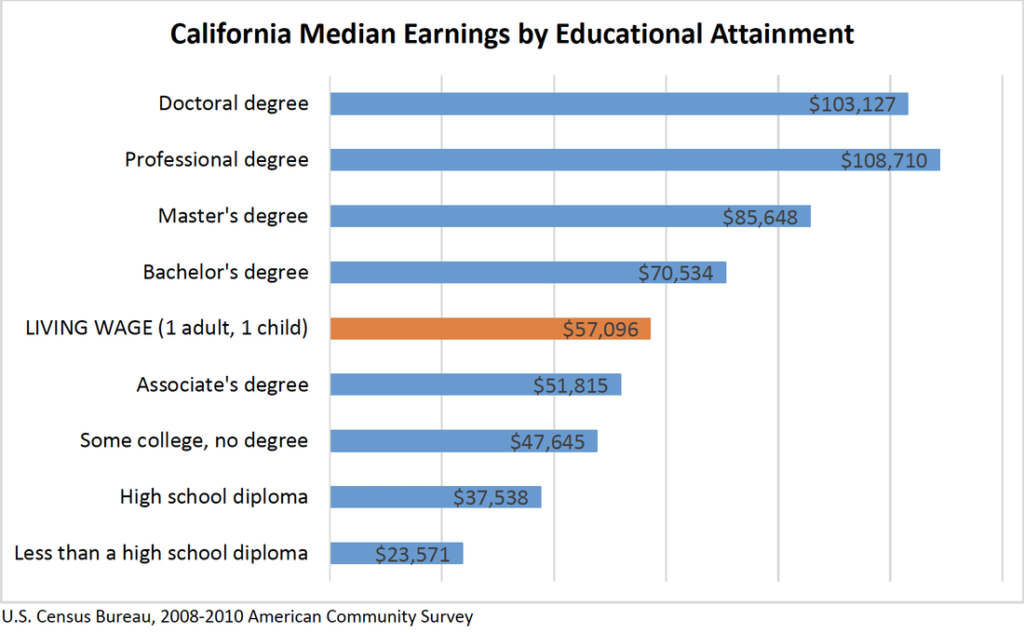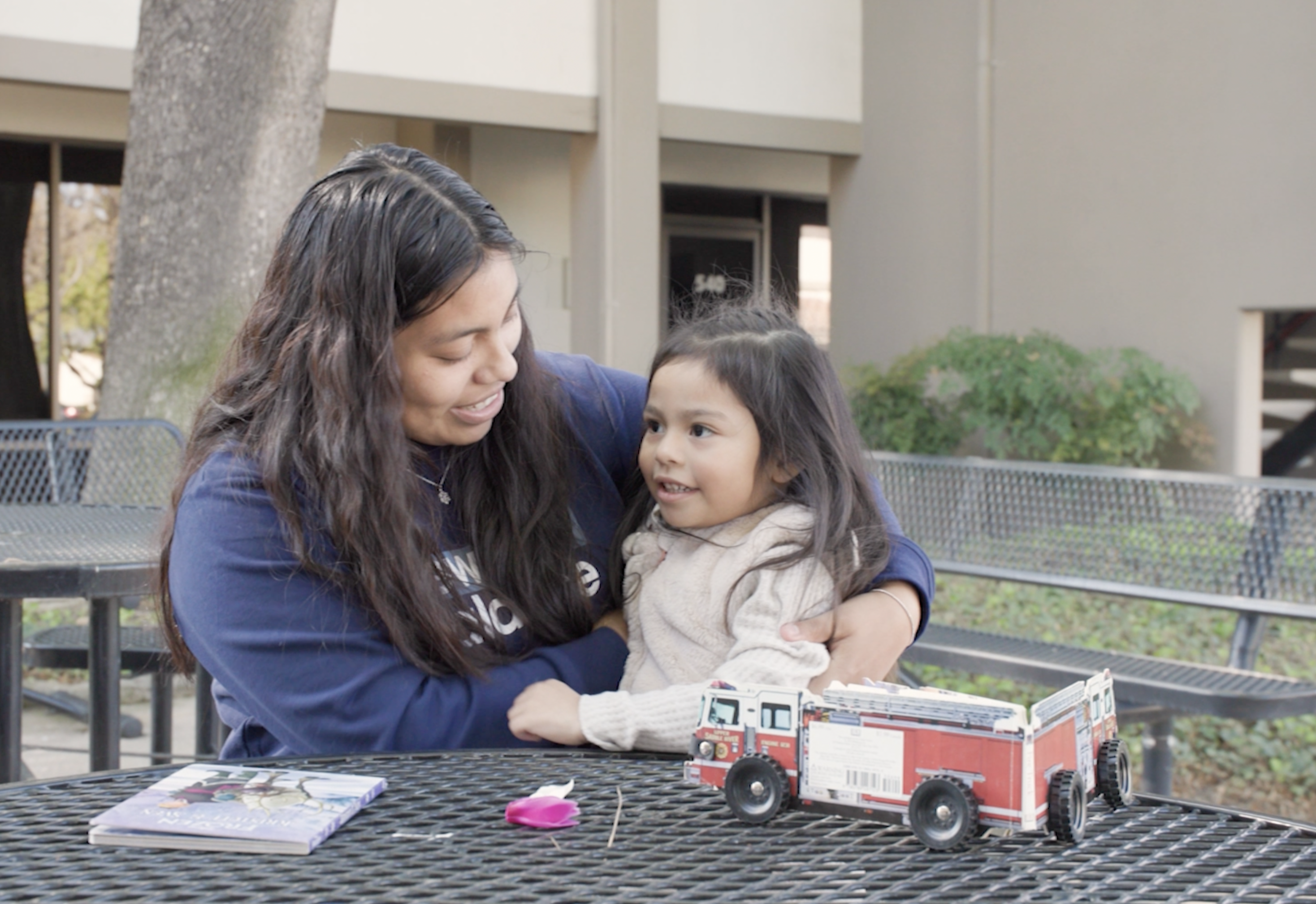Young Parenthood in California
IMPACTS OF TEENAGE PREGNANCY AND YOUNG PARENTHOOD
Young parenthood in California
In 2020, the expected number of pregnant and parenting teens and young women in California could fill both San Jose State and San Francisco State University campuses – but without support, less than 38% of these young women will finish high school, let alone college.
There are expected to be 62,405 pregnant and parenting young women under the age of 22 in 2020 in California (California Department of Health). This is equal to the entire student populations at San Jose State AND San Francisco State (https://www2.calstate.edu/csu-system/about-the-csu/facts-about-the-csu/enrollment). Without support, less than 24,000 of these young mothers will graduate high school and less than 2,000 will complete college by age 30.
Why resources for young families are imperative
Pregnancy at a young age diverts a mother’s/family’s resources to caring for a child. Young mothers choose to sacrifice what little opportunities/resources they may have to meet their child’s basic needs, including their high school education and dreams of going to college. In many cases, they do not know what resources are available to them and they do not have a strong community to shoulder the burden of the sacrifices (leaving school, working multiple jobs) they are making for their child.

Teen Success is the resource and support system they need to reimagine their life with their children. When young families are supported with access and connections to opportunities, they are able to break the cycle of poverty.
Teen pregnancy disproportionately affects young women of color. 2 out of 3 three babies born to teens in California are born to Latinas (National Center for Health Statistics) and low-income teens make up 83% of teens who give birth (California Research Bureau). While the overall teen pregnancy rate in the United States has dropped, there remain communities and neighborhoods where teen pregnancy rates remain high. These are predominantly under-resourced communities of color.
The young women Teen Success, Inc. works with come from low-income communities. 94% of them are women of color and many are from immigrant families. In addition to the challenges and stigma associated with being a young mother, Teen Success, Inc. members are faced with further complexities including housing instability; limited access to healthcare and reproductive health information; emotional and physical violence in their homes, relationships and communities; lack of access to affordable childcare; and racism and discrimination.
EDUCATION IS THE KEY
Research shows teen mothers who are able to remain connected to their high schools have better long-term economic outcomes for their families, and their children have better behavioral, social, and academic development. Teen Success, Inc. helps its members stay engaged in school, graduate, and persist through post-secondary education.
Education is Teen Success, Inc.’s highest priority for teen moms because it is the key to breaking the cycle of poverty. Studies show that when a mother attains higher levels of education, the better her children’s educational outcomes will be.
(Source: National Campaign to Prevent Teen and Unplanned Pregnancy. “Why It Matters: Teen Pregnancy and Education,” March 2010.)

IMPROVING FUTURES FOR YOUNG FAMILIES
Teen Success, Inc. empowers young women who become mothers in their teens to achieve their full potential in school and as parents, so two generations thrive. We believe that education is the key to maximizing each young woman’s potential and making our communities strong. We know that when young mothers are given the right supports and access to opportunities, their families, our neighborhoods, and entire communities are strengthened.
Our two-generation approach involves partnering with young mothers to heal trauma, build skills and a growth mindset, and address the barriers they face to being successful in school and in life. We support young mothers in finding solutions to challenges in order to achieve the following goals:
- Complete high school and obtain a post-secondary degree or certificate
- Develop the knowledge and skills to nurture their child’s positive development
With this program, Teen Success, Inc. is creating a pathway out of poverty for two-generations, young mothers and their children. Learn more about the Teen Success, Inc. Program.
How Do Moms Hear About Teen Success?

| We often share how one of the services Teen Success, Inc. provides to our participants is access to resources and opportunities as our participants often don’t know what programs are available to them. But then, how do pregnant and parenting young women find out about the Teen Success program in the first place? Advocates at Teen Success work hard to network and create relationships with local nonprofit, health, and civic community agencies. These relationships are crucial to spread the word about the availability of the program to the young women+ who could benefit from it. Of the participants in the program, 39% are referred by Social Services and schools, and another 12% are referred through a healthcare provider. |
Young mothers who are already in the program are important sources for referrals. They become advocates themselves, telling their peers to connect with Teen Success and try out the program. Participants in the program make up 17% of all referral sources. Having a young mom’s stamp of approval is the utmost compliment and the warm invitation to join shows a potential participant that she is not alone in her parenting journey.

We partner with schools and community agencies to host peer learning groups in the community spaces our young families are already at. Doing so make the transitions between life activities easier for moms and their children. It allows Teen Success to have a regular meeting place, space for supplies, and an appropriate extra space for childcare while moms learn together.

Our model and referral structures are built to partner with young families in the areas where they live – we come to them. We work to ensure we are imbedded in the community, from hiring staff who are from the same communities to making sure our program locations are accessible to the young families we work with. This creates a safe space for young women to discuss the challenges they are facing as mothers and students, learn to advocate for themselves, and develop parenting skills so their children can also grow and thrive.
We are able to support the young families in our program because of our incredible program partners, including those who provide space for Peer Learning Group, Bring Me a Book who provides free books for all our participants, and the organizations and donors who provide diapers and wipes for our participants, including Help a Mother Out, Fresno County Food Bank, local community groups like Hands4Hope-Youth Making a Difference in El Dorado Hills, and other caring community members.
By partnering with other organizations and imbedding ourselves in the community, we are supporting young families in a way that works best for them. If you or anyone you know serves young women+ who are parents, please tell them about Teen Success. Anyone can get in touch with us via our contact page, agency referral, or self-referral page.
Partnering With Resilient Young Mothers

Every month, we have the opportunity to share stories of successes and challenges that our participants face. As well as the individual stories of our participants, we also wanted to share more information on who are the young mothers and children of Teen Success, Inc. as a whole.
The young women in our program are strong, resilient and determined. As well as being mothers, they are students, workers, artists, and social justice activists. Their children range in age from newborns to 8-year-old kids. Our moms want them to succeed at every stage in their life and to share their passion for education.
Young mothers face some of the most significant barriers to success. In addition to the challenges and stigma associated with being a young mom, Teen Success, Inc. participants are faced with further complexities including housing instability; limited access to healthcare and reproductive health information; emotional and physical violence in their homes, relationships and communities; lack of access to affordable childcare; and racism and discrimination.
We serve communities where teen pregnancy rates remain high despite the downward trend across the nation. Young parenthood disproportionately affects young women of color. Although poor and low income teens only make up 40% of the adolescent population, they account for 83% of teens who become young parents.

What Challenges Do Young Mothers Face?
The young women we serve face some of the most significant barriers to success – poverty, childhood trauma, housing instability, family and relationship violence, lack of access to affordable childcare, and the stigma of being a young mom.
Nationally, only 38% of young mothers graduate from high school and less than 3% finish college by age 30. Adding to a young mother's challenges are the environmental, social, and systemic factors that make it harder for them to chart a path to the life they envision for themselves and their children.
| 25% of our participants are or have been in the foster care system 54% are the child of a teen parent | 42% have previously been suspended or expelled from school 92% are experiencing poverty | 23% have an IEP at school to support individual education needs |
Partnership With Young Families Leads to Results
Education is the key factor in breaking the intergenerational cycle of poverty faced by young families. Teen Success, Inc. partners with young mothers to complete high school and a post-secondary degree that leads to a living wage, and nurture their child’s positive development to ensure the success of the whole family.
The mission of Teen Success, Inc. is to create economic advancement for multiple generations, by partnering with young mothers to further their education, build life and career skills, and nurture their children’s development.
Leadership Update at Teen Success, Inc.

Dear Friends,
Like you, I have spent a lot of time over the past year reflecting on so many things, including what my family needs. The pandemic brought many challenges for working parents, but also allowed us to spend more time with our children. Through all of this, I realized that I needed to make some changes to better prioritize my family. It is therefore, with mixed emotions, that I will soon be moving to the East Coast to pursue new opportunities for myself and my children. The choice to make this move hasn’t been an easy one, but the past year has made it clear that this change is necessary for my family to thrive.
I am so grateful for your support and dedication to the young families Teen Success, Inc. partners with. Together, we have created an incredible program of comprehensive wrap-around services for both young mothers and their children, supporting their education and upward economic mobility. I am so proud of everything our community and young families have accomplished since I joined Teen Success, Inc. in early 2015.
I will continue to remain involved and support the success of our young families however I can. The Board of Directors has appointed fellow Board Member, Sandra Flores, to act as Interim Executive Director starting August 2nd, while they conduct a search for a new Executive Director. Both Sandra and the new Executive Director will continue focusing on supporting young mothers through post-secondary education and ensuring their children are learning and thriving as well.
Sandra has been a longtime supporter of Teen Success, Inc. and has over 15-years of experience developing strong community partnerships throughout California and advocating alongside communities of color to advance equity. Along with our entire Board of Directors, led by Ellen Moir and Madonna Bolano, Sandra is committed to supporting the organization and our stakeholders through this transition.
I have cherished every moment at Teen Success and am proud of all the new supports we have put in place for young families, including: educational stipends for all young mothers who want to attend post-secondary education, a focus on early development and interventions for their children, and during this time of COVID and economic unrest—direct assistance to ensure our young families have their basic needs met.
The hardest part of this move is leaving the people who put their heart and soul into this work. It has been an amazing privilege to work with you, our incredible staff, and the young mothers who inspired me every single day to be the best mom I can be for my children.
I am going to miss this community, but I know you will enjoy getting to know Sandra. As always, the team at Teen Success, Inc. is here to support you as you support our young families.
Sincerely,
Karin Kelley
Executive Director
Early Literacy and the Benefits of Reading 15 Minutes a Day

Early childhood development is one of the core components of our two-generation program. To ensure that children are meeting their age-appropriate linguistic milestones, we place a heavy emphasis on supporting our participants to read to their children and promote early literacy. We believe in making reading fun and we help our program participants start libraries for their children at home by providing free books through our partner, Bring Me A Book Foundation.
What is Early Literacy?
Early Literacy is the development of skills that support children in learning to read. Children who meet their literacy milestones and are reading proficiently in the early grades are more likely to graduate high school and enroll in college (source: https://www.renaissance.com/solutions/early-literacy/). Early literacy is essential to giving children the foundation they need to learn and grow.
Why is Early Literacy Important for Families?
Our participants love getting books for their kids (in English and Spanish) and we encourage them to read to their children daily. Daily reading improves children’s cognitive skills and helps moms bond with their children. For many program participants, learning about children’s brain development is new, as is learning that reading can have a positive effect on their language development and their bond as mother and child.
Teen Success has had a big impact in my first year of being a mom. It has showed me…how to get [my son’s] first year of life going on the right track by reading to him every night. – Adileni, Teen Success Participant
Unfortunately, achievement in early literacy is negatively impacted by racial inequities in access to resources and knowledge. In the state of California, just 55% of Latino and 58% of Black children were read to everyday, as compared 83% of White children. Latino children are less likely to be enrolled in preschool at ages 3-4 as compared to White children (source: https://scorecard.childrennow.org), often due to the lack of affordable childcare and preschools. From an early age, young children of color aren’t given the same access to opportunities to succeed.
Ninety-six percent of Teen Success, Inc. families are living in poverty, increasing the barriers children face to achievement in early literacy. Studies have shown one of the best ways low-income families can improve reading achievement is by having books and printed materials in their home (Newman, Sanford, et all. “American’s Child Care Crisis: A Crime Prevention Tragedy”; Fight Crime: Invest in Kids, 2000).
In addition, our program participants learn about and are encouraged to talk and sing with their babies to foster healthy brain development. Reading aloud to young children is not only one of the best activities to stimulate language and cognitive skills; it also builds motivation, curiosity, and memory (Bardige, B. Talk to Me, Baby! (2009), Paul H Brookes Pub Co.)
How Do Reading Skills Affect School-Readiness?
According to the American Academy of Pediatrics, more than 1 in 3 children don’t start kindergarten with the skills they need to learn to read; and about two thirds of children aren’t reading proficiently by the end of 3rd grade. Additionally, according to Zero to Three, a baby’s brain grows to 80% of it’s adult size by age 3.
These statistics can seem alarming, and they are. However, the solution is simple. Reading is easy, accessible, and has the most impact in terms of growth for a child’s brain development. Bringing an intentional learning and development activity like reading into a child’s life puts them on a tremendous path to success during the most significant growth of their lives.
We’re encouraging moms to read with their kids to improve their children’s cognitive skills and help her family bond. By doing it, she’s preparing her children to be kindergarten-ready because they will have been exposed to the rhythms of language, learned sight words, and will love reading long before they start kindergarten.
Reading accelerates language development and 88% of Teen Success participants' children are meeting their linguistic milestones. Coupled with context-based developmental assessments, Teen Success, Inc. is helping moms prepare their children for success in school.
Reading aloud to a child for 15 minutes every day from the time they are born is the single most important thing parents can do to help children prepare for reading and learning. Reading aloud 15 minutes every day for 5 years adds up quickly! Over the course of 5 years, the 27,575 minutes or 456.25 hours spent reading, and that makes a tremendous difference in children’s lives. (Source: https://www.eita-pa.org/15-minutes-a-day-to-school-success/)
On average, young families at Teen Success, Inc. spend 16 minutes reading together daily!
Promoting reading and early literacy throughout the community is important for success in school and it’s fun! We’ve put together a community-curated list of children’s books for you and we hope you see a favorite. Feel free to share the list with your friends and family!
Happy reading!
How can we, as individuals, as a community, rise up to eradicate racism?

Updated: 4-20-2021
How can we, as individuals, as a community, rise up to eradicate racism?
We start on the inside. We all need to continue to look inside at our own biases because it is within ourselves that we must first demolish the beliefs that make us feel lesser than and make us look at other people as lesser than – what are we holding against others from the moment we see them?
Recognizing our own shortcomings is incredibly difficult, but to make change happen we must look within and take the next right action.
Injustice is dominating the headlines and our social media feeds and it makes it seem as though the dream of justice is only that, a dream. But it’s imperative that we cultivate our belief in taking the next right action. We can catch and question our everyday judgments about people: Is this thought true? Is this thought bringing me closer to people or farther away?
If the answer is “no” and “away” we can say: “I forgive this thought and I choose again.”
We can take a deep belly breath and choose a positive thought about that person, “she’s great at chess”; “he loves playing football with his little girl”; “she adores her grandchildren.”
We can then reflect on our original judgment and open ourselves to empathy, and empathy opens the door to change. And change, well, that’s why we’re here. Isn’t it?
We hurt deeply for Daunte Wright, George Floyd, Adam Toledo, Soon Chung Park, Hyun Jung Grant, Suncha Kim, Yong Ae Yue, Delaina Ashley Yaun, Xiaojie Tan, and Daoyou Feng, for their families, communities, and all people of color and allies experiencing trauma because of their killings. This list in no way encompasses every life taken by systemic racism and misogyny.
Today, some of us will celebrate holding George Floyd's murderer accountable. Others of us will see that this is not enough. True justice is a system in which human life is held in the highest regard, a system that embraces diversity, a system that acknowledges and moves to rectify its own shortcomings.
Below you’ll find a list of organizations where you can lend your support to our Asian community and to Daunte Wright’s family and community, and a mental health resource should you need it.
We know that words are not enough, but silence is not the answer either, and we believe transformation starts within. We're in this together, until justice becomes the new normal.
Lend Your Support to Our Black and Asian Communities
Stop Hate Crimes Against Our Asian Sisters and Elders
Donate and learn more about supporting Asian Americans and Pacific Islanders nationally, in Atlanta, and in California.
Black Lives Matter
Donate and learn more to fight systemic racism plaguing our Black community.
- Support Daunte Wright’s family and the Brooklyn Center community
- Sign up for ways you can fight racial injustice with Color of Change
Mental Health Resource
NAMI Helpline
Call 1-800-950-NAMI (6264)
M–F, 7 am to 5 pm PT for free mental health info, referrals and support.
Why direct cash is critical for young moms struggling to pay the rent in this pandemic

By: Diana Farias Heinrich, Communications and Marketing Manager, Teen Success, Inc.
Direct cash assistance has to be a part of the equation if young mothers and their children are going to survive the short and long-term consequences of the pandemic's economic crisis
Without financial support, young families are bearing the brunt of the worst long-term effects of the pandemic, from developmental delays on their children due to stress, food insecurity, and homelessness, to potentially lowering earnings across their lifetime for both mother and child due to inability to stay in school and support their child’s learning.
What is at stake if young families don’t receive financial support directly
The impact of the pandemic, where 4 in 10 children living in rental housing aren’t getting enough to eat and their household is behind on rent [1], is happening to young families too.
“Some moms are constantly on fight or flight mode and don’t know what tomorrow brings,” says Teen Success, Inc. Advocate Ana Robleto. “It’s important to provide direct financial assistance in addition to goods and services because most of our moms lack support from family. They [aren’t yet] financially stable enough to provide for their children.”
Currently, fifteen percent of Teen Success, Inc.’s participants are homeless or have experienced homelessness in the past three months.
How young families are being left behind by government stimulus checks and rent programs
Federal pandemic safety nets, from stimulus checks to rental assistance programs, aren’t made for undocumented immigrants or those who have informal lease agreements. Although some California relief programs include provisions for undocumented immigrants, they don’t go far enough or make up for lost federal benefits.
This is important when talking about young families because young mothers at Teen Success, Inc. are often immigrants themselves or children of immigrants.
Furthermore, for many families in the Teen Success, Inc. program who were already living in multi-generational, overcrowded housing, the situation has deteriorated further. COVID-19’s economic impact is driving more and more families living in low-income, under-resourced neighborhoods to live with other families in overcrowded rooms and apartments. For some, this is the only way to make ends meet and to make sure they don’t end up on the street. [2]
Nearly 50% of all Teen Success, Inc. participants, young mothers and their children, are living in informal rental situations and don’t have a lease. Most often, these young families are renting a room in a house or apartment, living with their relatives or partner’s relatives, and paying rent in cash.
Young mothers living in informal living situations don’t meet government requirements for COVID-19 rental support, including eviction moratoriums and back rent pay. They’re left out of government relief efforts, putting them more at risk of facing homelessness with their babies.

A third of the young mothers Teen Success, Inc. supports are at risk of eviction due to inability to pay rent, and the organization expects the number to rise as the pandemic continues.
Urban epicenters like Silicon Valley are fishbowls for economic disparities, so are Sacramento and Fresno. These are the same zip codes where teen pregnancy rates are high despite the downward trend across the nation and where Teen Success, Inc. operates it program.
Too many of the families Teen Success, Inc. works with were already facing housing instability and food insecurity when the pandemic took hold of everyone’s life. Worsening economic conditions are putting them in the eye of the storm with few resources to make it out.
How low-income, young families’ economic situations have been affected by the pandemic
Entering the second year of the COVID-19 pandemic, young families continue to experience the avalanche of consequences caused by its subsequent economic crisis, from homelessness to food insecurity, to rise in parenting stress and hopelessness.
Even the few young mothers who do have formal rental agreements and are staving off eviction through the rent moratorium, can’t offset the financial losses they have incurred during COVID-19. They don’t have enough income or steady work to back-pay missed rent when the moratorium ends.
They are in and out of low-wage, essential service jobs like restaurants and retail. One Teen Success, Inc. participant suddenly became the sole provider of her household with her partner and 1.5 year old daughter when her partner’s custodial job hours on a school campus were cut. “I get super stressed out because I know that we will be tight on money for bills and stuff,” she says.
As young women of color with families to support [3], Teen Success, Inc. participants are bearing the brunt of the worst economic downturn and the highest rate of job loss for women in three decades [4]. Many of their relatives have lost their jobs as well or experienced drastic cuts and changes in hours. Young mothers are struggling to make ends meet and provide for their children, and as a result, mental health challenges and parenting stress are on the rise as well.
There is no equity for young women of color without direct cash assistance

At the onset of the pandemic last March, Teen Success, Inc. moved quickly to provide limited one-time cash relief to the young mothers in its program. Strategic partnerships with other organizations, including Stand Together Foundation, Lucile Packard Children’s Hospital Stanford, and Destination: Home made it possible provide gift cards, cash, and essentials like diapers and wipes.
The organization continues to focus on helping young mothers meet basic needs for themselves and their children including food, masks, and everyday essentials like diapers and wipes. When its program went online, drop-offs of supplies became a regular activity.
Teen Success, Inc.’s highest commitment is to remove barriers to education for the young mothers in its program, and today the biggest barrier is surviving the negative economic and health impacts of the pandemic.
“Direct Assistance, especially during this pandemic, is so essential for moms,” says Teen Success, Inc. Advocate Aleah Cox. “My participants are always appreciative for the diapers, wipes, books, etc. that we provide, but direct assistance allows them to decide for themselves where their needs lie.”
Consistent and flexible economic support for young families is more critical than ever.
If there is to be any hope of achieving an equitable and just community everyone needs access to financial resources regardless of rental agreements, bank accounts, and tax returns, all things the government relies on to support communities. Teen Success, Inc. is going to make sure young mothers in its program are receiving the aid they need.
Teen Success, Inc. is providing direct financial assistance to its program participants in two ways – monthly cash assistance and emergency rental funds. Last month, the organization rolled out educational stipends for every young mother enrolled in a post-secondary education program. This direct financial assistance will be provided to all of its participants and on top of the educational stipend for those in higher education.
The organization expects that the influx of cash will help young mothers cover their families’ basic needs, forestall evictions and homelessness, and reduce stress mothers are facing while trying to provide for themselves and their children.
The economic downtown is turning the opportunity gap into a crater, arguably it already was. When there is already a crisis of homelessness and food insecurity among students in California [5], basic needs must be met first. Only then will young mothers be able to focus again on their educational ambitions and dreams.
Cash relief and rental assistance will be available to all young mothers in Teen Success, Inc.’s California programs across San Jose, Redwood City, Fresno, and its partner programs with Planned Parenthood Mar Monte in Sacramento and with Harmony at Home in Monterey County.
The direct assistance fund provides two forms of support, including:

Ongoing, monthly cash investments
Young mothers will receive $50-$100 monthly. This money is to be spent at their discretion for groceries, essential supplies and any other needs their family may have.
By providing no-strings attached cash assistance, Teen Success, Inc.’s participants will direct the money in whatever way will benefit their family most.
Emergency rental assistance
Young mothers at risk of eviction due to inability to pay rent will receive up to $500 to hold off eviction or homelessness. This one-time cash relief will be paired with additional support to help participants access other resources and develop a plan for future rent payments. Organizational staff will work with members to determine need and Teen Success, Inc. will distribute rental relief to the most critical cases first.
Cash security for all families is the way through the COVID-19 health pandemic
Teen Success, Inc. will continue to take a holistic approach in supporting young mothers, adding direct financial assistance to its program that already includes education planning and barrier mitigation, early childhood development and parenting education, financial education and career development, and connection to mental and physical health resources.
Ensuring young families are able to survive both the health and economic crisis of COVID-19 is critical now. The newest stimulus package isn’t going to go far enough to help young families who need it most, especially those who are not yet legal residents or unable to file taxes on their own. Long-term investment and access to resources via community organizations like Teen Success, Inc. is going to make the difference in how and in what condition young families are going to make it out of the pandemic.
If you have questions, please contact bross@teensuccess.org or send a message.
Sources:
- https://www.cbpp.org/blog/hardship-remains-high-latest-census-data-show
- https://www.nytimes.com/2020/08/01/business/economy/housing-overcrowding-coronavirus.html
- https://www.cbpp.org/research/economy/needs-of-younger-generations-argue-for-further-fiscal-relief-and-stimulus
- https://fortune.com/2021/02/05/covid-unemployment-rate-january-jobs-report-2021-jobless-job-loss-us-economy-working-women
- https://edsource.org/2020/california-schools-see-big-jump-in-number-of-homeless-students/641752
Cash for College: How Educational Stipends are Going to Help Young Mothers Stay in College and Even the Playing Field

By: Diana Farias Heinrich, Communications and Marketing Manager, Teen Success, Inc.
Cash grants, stimulus checks, microgrants – an influx of cash can mean the difference between survival and ruin for people experiencing poverty. That’s why in the age of COVID-19 we’ve seen two rounds of stimulus and more potentially on the way – cash helps people make ends meet.
For the majority of young mothers Teen Success, Inc. supports, educational stipends for post-secondary education are going to be that lifeline. Having low-restrictions and coupled with financial education, educational stipends will reduce the financial barrier that is often the reason young mothers do not pursue college, career, or technical education programs.
How much education do women need to earn a living wage today?
In 2019 and 2020, before the pandemic, Teen Success, Inc. piloted an extension of its San Jose program where young mothers would continue to receive supports from Teen Success, Inc. after high school graduation, aimed at helping them access post-secondary education and persist through completion of a degree or certificate.
High school education is no longer enough to earn working women a living wage, let alone when she has children to support. In California, those with less than a high school diploma earn $23,571 annually, which is less than half of the state’s living wage of $57,096 (US Census Bureau, 2008-10 American Community Survey).
Set against an education gap where wealthier students are earning more college degrees while minority, low-income students are learning less(1), it’s a hard climb for any low-income student of color, let alone one who has a family to provide for.
Now, with the postsecondary extension of the program launched across all of its California program sites, Teen Success, Inc. is introducing educational stipends with the intent of helping young mothers, 94% of who are living in poverty, to persist through post-secondary education.
Educational stipends are a bridge to college where few exist for parenting students
Introducing educational stipends for Teen Success postsecondary participants comes at a critical moment when minority and low-income college enrollment is at record lows due to COVID-19.(2)
To support young mothers who want to pursue post-secondary education, Teen Success, Inc. is now providing educational stipends to all of its participants pursuing any kind of post-secondary degree or certificate, for as long as it takes.
The $500 educational stipends, distributed every six months, are to be spent at each young mother’s discretion to address her individual barriers to getting an education – whether that’s tuition, fees, books, equipment, internet, transportation, childcare or anything else she may need. Educational stipends are a step up to making college work in a young mother’s everyday life and will help shoulder the sacrifices she has to make to provide for her family now and in the future.
Although the stipends will reduce financial barriers to pursuing post-secondary education, they won’t replace the need for young mothers to work full time, especially given their limited access to other means of financial support. Though many students can apply for financial aid, a majority of the young women in Teen Success do not qualify because they are not taking full college course loads. Progress is slow, sometimes inching forward one class at a time because they’re working full time. Educational stipends from Teen Success, Inc. don’t have a full-time college course requirement and let young mothers attend school at their own pace.
“One of my young moms has been struggling to meet the necessary requirements for the San Jose City College Promise program. [Students] must take fulltime coursework, or 12 units, and pass all classes to receive the program’s [financial] benefits, and for her, with two babies and two jobs, it became too much to handle,” says Susana Hernandez, Teen Success, Inc. Advocate.
Finishing high school is just the beginning – parenting students have a long way to go
When young mothers graduate high school, continuing on to college is like starting at ground zero in terms of childcare and transportation, with the additional barrier of having enough money to pay for classes, books, and school supplies. Little, if any, supports exist at the post-secondary level for parenting students and stigma continues to plague them and their families.(3)
Over 7 years, Teen Success, Inc. awarded 73 competitive scholarships to young mothers pursuing post-secondary education. However, the demand for financial support to pursue post-secondary education was much higher among the 1,500 families Teen Success, Inc. has served over the years. Every year, Teen Success, Inc. declined dozens of applications for scholarships because there were not enough funds to distribute to all of the applicants.
Moving from competitive scholarships for some, to educational stipends for all, is critical to an equitable approach to increasing the probability that young mothers will finish a post-secondary degree or certificate that will lead to living wages and benefits for their families.
Nationally, only 2% of young mothers will graduate college by the time they are 30. Competing responsibilities from working to put food on the table, to taking time off because their child is sick and can’t attend daycare, all contribute to this low rate of graduation, even though more women than ever are graduating from college.(4)
Education inequity is a solvable problem, educational stipends are an important piece of the puzzle
Educational stipends will allow Teen Success, Inc. to support every young mother in her pursuit of higher education. She will have the freedom to use the dollars as needed to best support her education and her family’s wellbeing.
Teen Success, Inc. believes education is key to breaking the cycle of poverty and educational stipends are an equitable way of enacting its mission. Educational stipends will help young families on their path to thriving futures by removing some of the financial barriers post-secondary education imposes on young mothers.
Sandra Morin, Teen Success, Inc. Advocate, said of the impact of educational stipends: “Most of these young moms are first-generation college students, so that in itself is an amazing feat. They don’t think they can enroll in college or even know where to start. The dream is there, the motivation for school, but they feel stuck. I let them know that Teen Success will be helping them financially and it’s a sigh of relief, one less thing they have to stress about. The funds can help them pay for childcare when they’re in school, or that much-needed laptop so they can complete their assignments. It’s such a positive thing that they get to be that role model they want to be for their child.”
Sources
- https://hechingerreport.org/policies-help-students-pay-college-continue-shift-toward-favoring-rich/
- https://www.abc10.com/article/news/health/coronavirus/community-college-enrollment-falls-amid-coronavirus-pandemic/103-c5116e9f-b68e-4821-be7f-00e5554cb5f5
- https://www.thelily.com/she-said-she-had-to-breastfeed-during-virtual-class-her-professors-reply-shocked-her/
- https://www.pewresearch.org/fact-tank/2019/06/20/u-s-women-near-milestone-in-the-college-educated-labor-force
Free downloadable infographic shows the challenges young mothers face to finish their education and how the Teen Success, Inc. program helps.
Teen Success, Inc. is building pathways to prosperity for two-generations, young mothers and their children.
As young women of color, Teen Success, Inc. participants experience limited access to healthcare and reproductive health information; trauma in their homes, relationships, and communities; lack of access to safe, affordable childcare and stable housing; all while facing the stigma of having a child in their teens. These factors compound the education gap they are facing.
The number one reason girls drop out of high school is pregnancy. In the United States, only 38% of teen mothers ever graduate high school, and less than 2% of young mothers graduate college by age 30.
There are expected to be over 62,000 pregnant and parenting young women under the age of 22 in California.
Without support, less than 24,000 of these young mothers will graduate high school, and less than 2,000 will complete college by age 30.
Despite the downward trend of teen pregnancy in the United States over the last decade, there are communities across the U.S. where teen pregnancy rates remain high.
These are under-resourced, low-income communities.
Of Teen Success, Inc.’s participants: 94% are women of color and 96% are living in poverty. Young women of color from low-income backgrounds are disproportionately affected by teen pregnancy. They face a cycle of poverty and young parenthood that clings on generation after generation.
Teen Success, Inc.’s two-generational program model works to break the cycle of poverty.
For low-income students, navigating barriers to education alone is hard; and for young mothers, remaining engaged in school becomes harder. They face shaming from educators, punitive absence policies, and a lack of support for moms who breastfeed.
As part of Teen Success, Inc.’s intensive, research-based approach, young mothers receive the supports and the education they need in four key areas to create thriving futures for their families, including:
- Educational Navigation: Planning & Achieving Educational Goals and Mitigating Barriers
- Health and Wellness: Connection to Physical, Reproductive & Health Resources
- Financial Well-being: Financial Literacy & Career Development
- Early Childhood Development: Building Skills and Knowledge to Support Their Child’s Positive Development
Teen Success, Inc. has empowered over 1,500 young families to realize their dreams; over 85% of participants have graduated from high school, and participants spend an average of 16 minutes reading to their children daily to prepare them for their own educational success.
Join our movement.
Learn how to join our movement at www.teensuccess.org and subscribe to our newsletters at www.teensuccess.org/subscribe.

Getting Low-Income Youth Through School During COVID-19

Low-income youth attendance is at its lowest, while affluent communities have the highest student attendance rates
One thing has been made clear by the latest spike in COVID-19 and the subsequent return to shelter-in-place: our youth are not alright.
The effects of the pandemic are hitting low-income youth hard: many young people are not in school or working, or are struggling to make ends meet even with essential jobs. This includes foster youth, homeless youth, justice involved youth, and many pregnant and parenting youth.
In low-income communities in San Jose, attendance among students is extremely low at 67% compared to student attendance in affluent communities at 99%. Across the nation, the trend is reflected as enrollment numbers dropped for low-income students attending college this fall. On top of this, parenting students are facing increase in food insecurity, housing insecurity and homelessness.
What does it take for a young mother continue her education in the season of COVID-19?
As seen with the young mothers participating in Teen Success, Inc., there is a gap in what schools provided in person – an escape from domestic violence, social interaction, WIFI, food, and at least some childcare options.
Now, with new shelter-in-place orders and rising COVID-19 cases, relief for teachers and students alike seems farther away than ever.
At least for now, navigating the barriers to education for young mothers and other low-income youth is about meeting basic needs first – shelter, food, income, safety. There are no solutions that offer zero risk.
Challenges of Distance Learning for Young Mothers

In-school learning means exposure for young mothers who return to multiple-family housing situations, and the ongoing challenge of securing safe, affordable childcare – a situation that’s become worse for young mothers as the pandemic drags on.
Distance learning means being saddled with the responsibility women have always primarily shouldered: caring for others. For many young women, this includes setting up their siblings for their own classes, feeding them, tending to their needs, and for young mothers, doing all of this while also caring for their own infants and toddlers– it’s no wonder that they don’t have time to attend their own classes.
Young mothers are often the primary breadwinners for themselves and their children and work for sub-poverty wages at essential jobs. For those who’ve lost their jobs, as many young mothers have, there’s the overwhelming uncertainty of when the next meal will come and how the rent is going to get paid.
“Compassion has not been present this year with COVID-19,” says Teen Success, Inc. Program and Partnership Manager, Niki Singleton, “especially for young families.”
While some schools have managed somehow to provide hot spots and technology, they’ve not lowered their expectations of their students or their teachers. Both students and teachers are expected to show up regardless of their circumstances at home.
These circumstances include lack of technology, domestic violence, extreme stress, food insecurity, and language barriers make it hard to be fully engaged in school.
Shaming and stigma persist around young mothers, and in some cases has worsened, because of distance learning. “It doesn’t matter how hard-working [a young mom] is – people see her having a child as a sentence."
Life for Young Families Beyond the Pandemic

Yet, through everything that has happened this year, young mothers at Teen Success, Inc. continue to look for the silver lining – experiencing life with their infants and doing whatever they can with what they have.
“It’s a double-edged sword,” says Singleton, reflecting on the lack of resources and support available to young parents, “even if she gets to spend time with her child, she’s still worried about how she’s going to pay the rent or where she’s going to live.”
Surviving as a young parent was hard before COVID-19 took over, and it has only gotten harder.
Teen Success, Inc. Advocates continue to be an essential resource for young mothers and their children through the heightened challenges brought on by the pandemic.
They drop off diapers and mommy-and-me kits to stimulate their participants’ children’s development; field crises such as loss of housing and food insecurity; and consistently infuse positivity, support, and planning to overcome the barriers to distance learning, so that beyond the pandemic, young mothers and their children will have a foundation from which to rebuild their lives.
| Dear Teen Success, Inc. Reader, We hope the content you’ve been reading has elevated your knowledge of the barriers young mothers face in achieving their educational goals and raising children who will thrive. Most of what you read on the internet about teen pregnancy or parenting teens doesn’t take into account the systemic barriers they face and disassociates the statistics from the real lives of young families. On our blog, you read about those challenges and how they truly impact the day-to-day lives of our program participants. Changing the perception about young mothers from stigma and stereotypes into empowerment is central in helping young mothers believe in themselves and achieve their goals. A teen mother is not simply a statistic--she’s a young woman with great potential and the ability to create the life she wants for herself and her family. It takes unwavering support, encouragement, breaking down barriers, and connecting them to the right resources. That’s where you come in. Only you can help us continue to provide these supports for young families:An Advocate who becomes a pillar of support and connection to resourcesPlanning for and achieving educational goals through post-secondary while mitigating barriers to successDeveloping parenting skills and building child development knowledgeDeveloping financial literacy, building career skills, and connecting to career resourcesDeveloping health knowledge and connecting to healthcare resources for both mother and childBasic necessities for mother and child such as diapers, wipes, and clothingAn unmatched community of support!As you continue to learn more about the challenges young mothers face, the climate of education for low-income students of color, and the ties between systemic racism and the education gap – we hope we can count on your donation to ensure we can continue meeting young mothers’ needs. |












